#logistics employment agencies
Explore tagged Tumblr posts
Text

What is the role of a transport and distribution manager?
A transport and distribution manager is responsible for overseeing the efficient movement of goods and materials within an organization. They manage logistics operations, including transportation planning, route optimization, inventory management, and coordination with suppliers and customers. Their role is to ensure timely delivery, cost-effective operations, and adherence to safety and regulatory standards.
#logistics recruitment agencies#logistics recruitment agency#logistics recruitment agencies near me#transport recruitment agencies#recruitment agencies engineering#engineering recruitment agencies uk#logistics employment agencies
0 notes
Text
if i had a nickle for every time i got a job offer right before my bday id have two nickles-
#this one isnt as big as last years tho ive just been offered a permanent position w the company#im a casual thru an agency atm#but still im happy bc i get the benefits of permanent employment like sick leave and personal leave#and a set schedule#and even tho i loathe the multibillion dollar company i work for they do actually look after us logistics employees#ty.txt
2 notes
·
View notes
Text
#charleston employment agency#charleston staffing agency#staffing agency#temp services#jobs in charleston#south carolina staffing agency#blog#industrytrends#south carolina#recruiting#logistics#healthcare#charleston#information#industry data#informative
0 notes
Text

Warehouse Staffing Agency
#Warehouse staffing agency#warehouse worker#warehouse staff#logistics recruitment#logistics employment
0 notes
Text
Alraz Job Consultancy: The Best Job Consultancy in Kerala, Kochi
Alraz Job Consultancy is the best job consultancy in Kerala, Kochi, and the top job consultancy in the region. Our main aim is to make everyone employed, and we have successfully helped many people find their matched jobs. Here's why Alraz stands out:
1. Comprehensive Employment Services:
We help individuals find jobs that match their skills and qualifications, ensuring a perfect fit for both job seekers and employers.
2. High Success Rate:
Many people have secured jobs through Alraz Job Consultancy, making us a trusted name in the industry.

3. Social Media Updates:
Follow our Instagram page for the latest vacancies and updates. We regularly post new opportunities on our social media platforms.
4. Round-the-Clock Service:
We provide 24-hour services to ensure that job seekers and companies receive timely assistance.
5. Employer Support:
We help companies find the best employees to drive their growth and development, believing that no company can thrive without top talent.
Alraz Job Consultancy is dedicated to improving the employment landscape in Kerala, Kochi, and all over India.
#opportunity#workplace#jobseekers#employment#student#career#job#kerala#sallarry#jobsearch#keralajobs#kochi#digital marketing#best digital marketing company#services#search engine optimization#marketing agency#logistics courses in kochi#marketing#business#sales#emailmarketing#ecommerce
0 notes
Text
For the past couple of weeks I've been part of a small team responsible for the logistics of a prestigious competition/event; last night was the formal Awards Banquet where we were served an amazing dinner catered by one of the city's best restaurants. During the breaks where we weren't running the show/working, I had a very long and in-depth conversation with a young colleague who's worked on this project all the way from the beginning planning stages (i.e. as far back as Feb/Mar this year). She shared her disappointment with the lack of acknowledgement that she's gotten from the agency's management for all the long hours and hard work she's poured into this project, and also the incredible frustration over the poor treatment she's getting from the same. For instance, she flew in from out of town, but because she's contracted to work 4 out of 5 days a week they're not paying her for today's travel day back home (which if you don't know is standard practice for event management - travel time is part of the job). This is just one of a long list of examples she shared with me.
The good news is, she's already decided to quit at the end of her contract (which is soon), but she still had some misgivings about doing so; like asking herself what, if anything, she could have done differently, and feeling like she failed because this is her first job out of uni and she couldn't make a longer go of it. For the record, she's an absolute delight and a superb employee - and if I were in a position to hire staff I would hire her in a heart beat. (Also she's been full time for a year and part time for 2 before that so...she's absolutely not leaving without giving it a go.)
I guess I'm sharing this story because there might be young people like her out there who need to hear what I told her last night. So here goes:
Yes, work can be frustrating and can suck - badly - at times, but you should not hesitate to leave any job where you're crying on a regular basis because of how stressful it is and how badly you're treated.
Yes, you should leave a job where your manager berates you regularly, or sends you emails on weekends/outside of work hours to berate you. If they have an issue with your performance, they should explain what you're doing wrong and help you or give you the tools to do it properly not just yell at you. I know this happens a lot (sadly) but also know that this is NOT normal and NOT something you simply have to suffer in silence over. You have every right to expect to be treated fairly, courteously and professionally at work.
Yes, you should leave a job where people take advantage of you and don't pay you for the hours you work. I read a lot about Gen X and Boomers lamenting the Gen Z's for not being good workers because they're not willing to put in the blood sweat and tears to hang on to their jobs but I'm Gen X and I say that's BULLSHIT. A) Not every Boomer/Gen X feels that way, and B) Employers, no matter how nice they are as people, or how much you might like them will absolutely take advantage of you and SCREW YOU if they can. You can and should fight for your every goddamned hard-earned/well deserved dollar because no one else will do it for you. Same goes for your career - you are the only one you can rely on to make the best decisions for you.
So why am I working with these guys? Well, I'm a freelancer (I'm a Marketing Consultant) currently going project by project so I have the freedom to say no to any job I don't want to take and also to walk away the minute it no longer suits me to continue the relationship. I've also been at this for 28 years, so I imagine there's a bit of reverse ageism going on because they know they can't pull the same crap with me. (So there you go, this one time in this one instance, being older helps lol).
Anyways, the job market is rough, many employers are appallingly rude to job seekers (ask me about ghost job postings some time UGH) and people can be dicks (water is wet ha). Just...know your own worth and don't feel bad about leaving something if it's not working - you owe loyalty to no one but yourself.
20 notes
·
View notes
Text
This is Jana, and she needs our help.

Jana is just 14 years old, but she’s an incredibly strong, bright girl so I best let her speak for herself:
Hello, dear friends. I am Jana from Gaza. I am 14 years old. I am here to share with you our story, a story that pulsates with hope and resilience in the face of the difficult challenges we have faced in Gaza.
I used to live in our warm home with my father Mohammed (42 years old), mother Samira (37 years old), brother Kareem (13 years old), and brother Ahmed (10 years old), in Gaza, during a time of calm and peace. We were studying in UNRWA schools run by the United Nations Relief and Works Agency. I loved drawing, reading, cooking, and playing with my friends. My brothers loved playing football.
We are in urgent need of your financial support to cover daily living expenses and travel costs. We are living as displaced persons in Gaza, and our economic situation is dire. We have to pay approximately 27500 dollars (5500 dollars per person) for coordination, visas, and logistical expenses to pass through the Rafah crossing to leave Gaza for Egypt. We plan to seek asylum in Belgium. The rest of the funds we are raising cover living expenses for two to four months in Egypt while we acquire a Belgium visa and 6 months of living expenses in Belgium before legal status and employment is settled. Additionally, the cost of purchasing basic necessities has risen significantly, more than ten times of what it used to be. While we remain in Gaza, we need your help to bear these costs.
We thank you for your support and solidarity with us in these difficult circumstances, and we are awaiting the support you may provide us.
#gaza genocide#Gaza#gaza children#children of gaza#gaza families#gaza fundraiser#gaza mutual aid#mutual aid#fundraiser#help others#be a good person#human rights#palestine#free palestine#israel#free gaza#israel is committing genocide#help gaza#save gaza#gaza gofundme
15 notes
·
View notes
Text
[“Criminalisation grants the police power over sex workers, and at the same time creates points of leverage which can be exploited by predators. We have both experienced phone calls from people claiming to be clients, asking, ‘Do you work alone then, love?’ and had to gamble, in that moment, with two competing problems. Is he seeking to rob or assault me, in which case I should put him off by telling him I work with a friend? Or is he a cop seeing if he can make a brothel-keeping arrest that day, in which case I should put him off by assuring him that I work alone?
As we see again and again among our friends, two people working together in a flat are powerless in the face of a landlord who can charge extortionate rent – or explicitly blackmail them – under the threat of reporting them to the cops. The same two workers have little defence when a client decides that this culpability is leverage he can use to assault them or to evade justice. A few years ago, two London sex workers (we will call them Lily and Jane) were working together in a flat as a safety measure after one of them was feeling shaken up after a recent incidence of violence. While Lily and Jane were working, a client of Lily’s turned aggressive. Jane came into the room to back Lily up. The client, instead of becoming chastened, became even more confident, telling them, ‘You can’t call the police on me – there’s two girls here! This is a brothel! I’m gonna call the police on you!’ This is the kind of man given power by brothel-keeping laws.
In a collective workplace, all the sex workers risk criminalisation. But a sex worker who works with an agent or manager (in a brothel, massage parlour, walk-up, sauna, or escort agency) is not criminalised – that buck is passed to the boss who organises or facilitates their work. This, along with the safety that comes with having another person on-site, makes employment in brothels and parlours attractive to many sex workers. Thus, the law’s failure to distinguish between these two kinds of set-ups pushes sex workers into the arms of managers. It also allows managers to extract more profit from sex workers’ earnings – some of the manager’s ‘cut’ comes out because they are shouldering the threat of criminalisation.
Being self-employed can be difficult. For sex workers who are carers, parents, or students, it can be a reasonable alternative to hand over some proportion of income to a boss who takes care of the logistical demands of commercial sex: answering the phone or email, running a website, setting up advertising, holding the money during the booking, organising the rental of the premises, providing equipment, and organising the cleaning of the venue. Rather than self-employment swallowing their free time and personal space, they can do one or two shifts a week and leave the job behind as soon as they step out of the door.
While the sex worker isn’t breaking the law when they’re working for a boss, the workplace is still an illegal one. When your workplace is criminalised, there are no employment tribunals, no HR departments, no legal contracts or health and safety inspectors – and therefore extremely limited recourse when your working conditions are bad. Your employer may threaten you with the sack if you decline to provide services to a client. They may fail to stock provisions like condoms, verbally abuse you, arbitrarily dock your wages, coerce you into longer shifts, or subject you to sexual harassment. They may simply be negligent in their obligations to provide basic safety, such as failing to pick up the phone in an emergency or to step into the room when you call for them. You have only two choices: do nothing or make a police report.
Assuming that you need the money, this presents a conundrum. If you call the police, the response will be a raid – resulting in the closure of your entire workplace, a lost job for you and every other worker there, and potentially deportations. A raid poses other risks, too, like the confiscation of money, belongings, or drugs. Many managers or agency owners firmly discourage reporting sexual violence to the police and emphasise to their employees that raising the alarm on a rapist will put everybody out of work. Almost all sex workers are in the job because they need the money. When made to pick between their income and making bad bosses or rapists accountable, the sex worker often has no choice but to tolerate bad conditions. Sex workers effectively protect their abusers in the same way some survivors of domestic violence have to protect partners upon whom they are financially dependent when police are called out. As grassroots feminist groups have noted, a heavy-handed police response is, in some cases, worse for survivors than nothing at all.
In these ways, ‘pimping’ laws limit victims’ responses to abusive managers. Yet people who would be willing to decriminalise the selling (or even buying) of sex often still wish for penalties against third parties. The idea that a third party should be involved in the transaction strikes people as intuitively wrong – exploitative at a fundamental level.
Such an assumption can only survive by obscuring the mundane realities of sex workers’ everyday lives. A spouse or partner who helps answer emails or schedule appointments, a receptionist who works the phones for tips in a brothel, or a sex worker who sublets her flat to a friend in times of illness or injury are all vulnerable to pimping laws. This means that should something happen – for example, if your workplace is robbed by armed men – you will probably hesitate to call the police for help, for fear of endangering others.”]
molly smith, juno mac, from revolting prostitutes: the fight for sex workers’ rights, 2018
24 notes
·
View notes
Text
Good afternoon TUMBLR - April 21th - 2024
''Mr. Plant has owed me a shoe since July 5, 1971."
Mohammedia, Morocco – 2002
It was beginning of June and I got a call from Rome: the kind Mrs. Sette - HR Representative of TECHNIP Italy - asks me if I am interested to on mission to Mohammedia, Morocco. Of course I am! Was my answer. A week later, I am summoned inside the mega headquarters of Technip Italia, in Rome, to carry out the medical examinations and sign the employment contract. At the time I had just bought a new car, an Alfa Romeo 147, so we organized a trip to Rome with my family. It was a pleasant trip and stay, and we had the opportunity to visit Sperlonga and Gaeta.


Sperlonga.

Gaeta.
I left for Casablanca at beginning of July, returning to work in Morocco after 11 years. I arrived at Mohammed V airport and with the ''excuse'' that Technip was aware of my past in Morocco, no one was there to welcome me. A Grand taxi took me to the Hotel Sabah as was previsiosly agreed - I would stay there for a few days, until I'll find a suitable accommodation. In the late afternoon I was joined by the Mission's Head, Mr. De Sanctis, a Roman guy, an elderly person with some walking problems. At dinner he explained to me that the team would be made up of a total of 4 people: a civil supervisor, a mechanic, and an electro-instrumental supervisor
THE PROJECT. The SAMIR refinery in Mohammedia, about 20 km north of Casablanca, was built by Italian Snamprogetti/SAIPEM in the '70s. The property had more recently been acquired by a Joint Venture between a Swedish Investment Fund and a wealthy Saudi investor. The new ownership had decided to modernize the complex, building new production plants next to the existing refinery. For this purpose, TECHNIP was contacted to follow up the partial demolition of the existing plants and part of the Tank Farm, and prepare the areas where the new plants would be built. Our mission was to supervise the demolitions of the tanks, and the preparation of the areas with selected materials capable of withstanding the considerable loads of the new installations. SAMIR had not yet appointed the Main Contractor of the new plants - a contract worth 316 million dollars - TECHNIP Italia had agreed to follow the preparatory works to try to ''get a foot in'' the refinery and undermine others competitors.
MISSION TASK FORCE. In addition to the aforementioned Mr. De Santis, the following people were part of the mission: Mr. Rinaldo Cozzi: originally from Cerro Maggiore (North of Italy). He was our electro-instrumental expert. A decent person, even if a little closed off. He only went out with us during the visits of the Technip manager Ing. Petrillo. I will meet Cozzi again in Shah – Abu Dhabi, where he had a position with SAIPEM pipeline. Mr. Mario Maggi, from Piacenza - a jovial and open guy, he was coming from a previous experience in Senegal. Expert in turbines, compressors etc, in truth he didn't have much to do since we were only talking about demolitions.
LIFE IN MOHAMMEDIA. Mohammedia is the seaside city of Casablanca. Equipped with somewhat old hotels, it is made up of residential areas of holiday villas built in the early 1980s. The city has therefore become a destination for medium-low level tourism, also following the construction of the refinery and the Power Plant overlooking the Atlantic Ocean.
LOGISTIC. After an initial period in which I slept in hotel, I found a decent oceanfront apartment through a real estate agency. Inserted in a beautiful park, the apartment was on the first floor of a holiday condominium. The local owner was living abroad, and had entrusted the agency with the task of managing the rent from the apartment. I really enjoyed it, and I stayed in the same apartment for the entire ten months of my stay in Mohammedia.
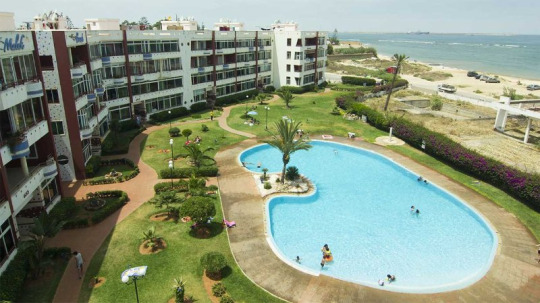
Mr. De Sanctis lived in a villa on the Plage Manesmane.

Mr. Cozzi in another house near De Sactis, while Maggi had chosen to stay secluded in a villa further inside the city.
SUB-CONTRACTOR The Contractor that would carry out the work was chosen directly by the Technical Management of the refinery. Mr. Berrada, the Site Manager was a competent and approachable young engineer. The history of this Company is intertwined in a curious and surprising way with the attack that King Hassan II suffered on 16 August 1972, when the Royal Boeing 727, returning from an official trip to France, was attacked by military jets of the Force Armee Royale. According to the reconstruction of the event, the plane was hit on one of the engines, but the pilot managed to make escape the jet unscathed, and thus saving the life of the Sovereign. That pilot's brother was the owner of a small building Contractor from Casablanca. The pilot's exploits made the fortune of his brother, who in a short time became one of the largest entrepreneurs in the construction sector in Morocco, going so far as to build the so-called ''Twin Towers'' of Casablanca, which with their height of 128 meters are have long been the tallest skyscrapers in Morocco.
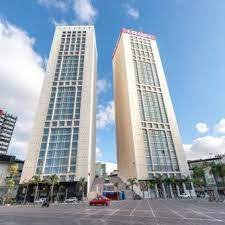
WORK PROGRESS. The rafinery plot was overlooking the Atlantic Ocean. The progress of the works was quite regular, the demolition of old tanks continued apace and so did the creation of new areas for the new plants. To the South of the plant, divided only by a reception wall, stood the coal power plant built in the 1980s by the Italian Cimi Montubi Group.
FLOOD DISASTER - NOVEMBER 2002. Everything went well until the beginning of November. Yes, it's true, sometimes we had some problems getting the refinery operators out of their offices before proceeding with their demolition. But it had been raining cats and dogs for three days, even though they told me it was the season. On a Saturday morning the SAMIR management received a call from a dam Director, located approximately 45 km away from the plant. The Director warned that since the water inside the artificial reservoir of Barrage Oued El Maleh had now reached the overflow point, it had been decided to open the gates of the dam, and let part of the water flow into the Oued El Maleh , whose course, after reaching the refinery, flowed into the Atlantic between the refinery itself and the Royal Golf Club. The Dam Director estimated that the flood wave would reach the refinery towards the late afternoon of the same day. As a precaution, operations at the plant should have been stopped. A consultation with Saudi ownership categorically ruled out shut down onthe entire complex. The costs of shut down, lost production, and start-up were the reasons given for refusing to stop operations. Never was a decision more wrong.
At 3.00 PM order had been given to leave the plant. The water from the Ouadi El Maleh had already overcome the barrier set up at the entrance to the plant, and was spreading throughout the area. The area of our offices, lower than the rest of the refinery, was already heavily flooded. We returned to Mohammedia with in mind the worried faces of the operators who were preparing to spend the night in the plant. It was around 9.45 in the evening when the first explosions were heard. I went out onto the apartment balcony and looked towards the South: I could see some flashes that lit up the dark night. Firefighter and Red Crescent sirens. And then an explosion louder than all the others: we then learned that a diesel tank had been blown up. We would find the roof of the tank thrown like a giant frisbee 150 meters away. The fire had attacked the power station, and triggered the explosion when the water reached the high voltage bars. Most of the utilities were destroyed that night. Thanks to the work of firefighters who also came from Casablanca, and of the refinery operators, the fire was contained and did not reach the fuel depot area where there were dozens of tanks full of oil and diesel: it would have been a Biblical disaster.
Two operators lost their lives in the accident, and numerous were injured. When the refinery was made safe, the highest authorities in Morocco came to visit, first and foremost King Mohammed VI. The refinery management asked us to participate in the damage assessment, alongside a specially established insurance team. At the end of the survey, which lasted weeks, the damages were estimated at 157 million dollars. During the cleaning operations from the mud that had invaded the entire area of the plant, many teams of volunteers showed up after King Mohamed VI's appeal on TV. What remained was the regret of a disaster caused once again by a decision dictated by mere selfishness. The questions I asked myself at the time was: ''In his country, would the Saudi owner of the refinery have made the same decision, that is, not to stop the plant?''




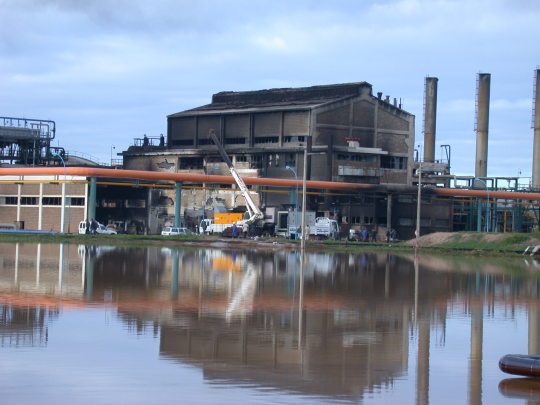




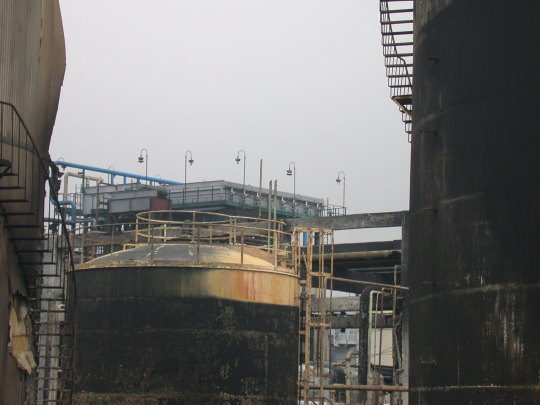


END OF MISSION. At the end of April, the enormous cleaning operation of the refinery had been completed, even if production had not been able to resume due to the enormous damage caused by the flood and the subsequent fire. Our work to prepare the areas was coming to an end, and the most disparate rumors were circulating about the name of the Main Contractor who would win the contract for the new installation. The sentiment was that they would not be awarded to TECHNIP Italia, regardless of our performance during the Early Works.
Italian Giant SAIPEM was awarded the project.
3 notes
·
View notes
Text

Marketing or logistics, which one is the best career option?
Deciding between a career in marketing and logistics can be quite a tough choice, but let me give you some insights into both fields to help you make a well-informed decision. Ultimately, the best career option depends on your interests, skills, and long-term goals.
Marketing is an exciting field that involves promoting and selling products or services. It requires creativity, excellent communication skills, and a knack for understanding consumer behavior. If you enjoy brainstorming creative campaigns, analyzing market trends, and building relationships with customers, then marketing might be a great fit for you.
logistics is all about managing the flow of goods and services from point A to point B. It involves strategic planning, coordination, and problem-solving skills. If you thrive in a fast-paced environment, enjoy optimizing processes, and have a knack for organization, logistics could be a rewarding career choice.
Ultimately, the choice between marketing and logistics depends on your personal interests, strengths, and career aspirations. Don't be afraid to explore both fields through internships, networking, and research to get a better sense of which career aligns with your goals and personality with Quality First Recruitment.
Good luck on your journey!
#international recruitment agencies#top 10 recruitment agencies uk#construction recruitment agencies london#construction recruitment agencies#construction recruitment agency#recruitment agencies for construction#recruitment agencies construction#recruitment agency construction#construction recruitment agencies near me#construction employment agencies#recruitment agencies liverpool#liverpool agency recruitment#liverpool recruitment agency#recruitment agencies in liverpool#liverpool recruitment agencies#recruitment agency liverpool#best recruitment agencies liverpool#recruitment agency in liverpool#logistics recruitment agencies#logistics recruitment agency#logistics recruitment agencies near me#transport recruitment agencies
0 notes
Text
What do you Want a CANDIDATE or a JOB?
Job or a Candidate? What do you want? Definitely, this sounds weird. But yes what do u want a candidate or a job? Because we have both. AJEETS provides both. Yes, AJEETS helps by recruiting the best skilled and unskilled workforce to various companies abroad and also guides and helps the candidates in shaping a bright career.
AJEETS is a manpower recruitment agency in India that recruits skilled and unskilled human resources from India, Nepal, Sri Lanka, the Philippines, Sri Lanka, Kenya, and Uganda. AJEETS is in this business for the last 16 years and is one of the most reliable and dependable agencies. AJEETS has its own experts who have a good experience in different industries. Our experts also guide the candidates.
As the leading manpower recruitment agency in India, we are proud of our knowledge in e-staffing solutions, job placements, employment help, and recruitment. One of the most important parts of any company or business is its human resources, and we handle this for many foreign businesses, particularly those in the Gulf nations.
In order to maintain industry competition, AJEETS, a manpower recruitment agency in India, adheres to the principle that it is our goal to provide meaningful solutions for both individuals and businesses. By bringing together individuals from around the globe, our services will assist firms in succeeding in a setting that is changing quickly. Every year, we guarantee potential candidates a position where they are deserving of it and promise businesses solutions that meet their needs.
After a fruitful 16-year journey, the public today recognizes our manpower recruitment agency in India as a capable, trustworthy, and all-inclusive Indian recruitment firm. Having started with a few industries, we now provide services to a wide range of sectors, including; Construction, Steel, Infrastructure, Oil and Gas, Hospitality, Medicine, railways, Marine, IT, Electrical and Electronics, Dairy Farm, Logistics, Automotive, Chemicals and Pharmacy, and many other industries. Following the selection of a candidate, we have an orientation or introduction program where he is made aware of important topics including the work culture of the respective organization, industrial practices, safety concerns, labor laws, and other pertinent issues. We constantly refresh our database to provide you with the best job opportunities.
Our commitment to going above and beyond to provide the best solutions to our clients has been the cornerstone of our long-standing reputation. The standards set by our applicants and clients have always been met by AJEETS. We assist applicants with their migration from one country to another in addition to simply recruiting them. When they migrate, we assist them in obtaining their visas and other necessities. Without a doubt, AJEETS succeeds in being the best manpower recruitment agency in India.
We take a unique approach to staffing as an all-inclusive manpower recruitment agency in India. With this process, we stand out because we guarantee success for both job seekers and companies. We make an effort to comprehend the businesses' lists of both temporary and long-term requirements before attempting to match them up with our list of available applicants' skill sets. Our process achieves exceptional results while serving as a link between the two parties.
As a committed personnel agency in India, AJEETS believes in maximizing human potential to pave the way for successful careers. We help applicants find jobs at the greatest organizations on the globe as a manpower company by supporting their goals and dreams. At the same time, we observe that multinational corporations' temporary and permanent openings attract applicants who can advance their companies' operations. Our services are offered all over the world with an emphasis on countries like Qatar, United Arab Emirates, Kuwait, Saudi Arabia, Bahrain, and Oman in the Middle East; and Singapore, Brunei, Malaysia, Maldives, South Korea, Indonesia, and China in the Far East Countries and the UK, Germany, Poland, Romania, Serbia in the Europe Continent. Make us your long-term recruitment partner with a presence in India today!
#manpower recruitment services#overseas manpower consultancy#job agency#employment agency#best consultancy
2 notes
·
View notes
Text
Best Travel Management College in Kolkata: A Complete Guide
The travel and tourism industry is one of the fastest-growing sectors worldwide, offering a wealth of career opportunities. For students passionate about exploring the world while managing the logistics of travel and tourism, pursuing a degree in Travel Management is the first step. Kolkata, known for its quality education and cultural heritage, offers some of the finest institutions for aspiring professionals in this field. Among these, SBIHM (Subhas Bose Institute of Hotel Management) stands out as a leading choice.
Why Choose a Career in Travel Management?
Travel Management is a dynamic field that combines business skills with the art of providing exceptional travel experiences. Professionals in this sector work in areas such as travel planning, tourism marketing, event management, and customer service. With the growing global demand for skilled travel managers, this is a promising career choice for those who love travel and enjoy creating memorable experiences for others.
Top Reasons to Choose SBIHM for Travel Management
1. Comprehensive Curriculum
SBIHM’s Travel Management program covers a wide range of subjects, including:
Tourism Marketing and Management
Travel Operations and Planning
Event Management
Hospitality and Customer Relationship Management
Sustainable Tourism Practices
This well-rounded curriculum prepares students for various roles in the travel and tourism sector.
2. Experienced Faculty
SBIHM’s faculty members are industry experts with years of experience in travel, tourism, and hospitality. They provide students with practical insights and knowledge about the latest trends in the industry.
3. Hands-On Training and Internships
SBIHM emphasizes experiential learning through internships and on-the-job training with leading travel agencies, airlines, and tourism boards. This practical exposure helps students gain valuable industry experience and enhances their employability.
4. Placement Support
SBIHM has a dedicated placement cell that assists students in securing jobs in reputed organizations. Graduates have gone on to work with top travel agencies, airlines, event management firms, and international tourism companies.
5. State-of-the-Art Facilities
The institute provides modern classrooms, travel simulation labs, and access to the latest travel management software, ensuring students are equipped with the tools they need to succeed.
6. Global Exposure
SBIHM offers opportunities for students to participate in international projects, travel expos, and study tours, giving them a broader perspective on the global travel industry.
Career Opportunities After Studying Travel Management at SBIHM
Graduates from SBIHM can explore diverse roles, including:
Travel Consultant
Tour Manager
Event Coordinator
Airline Operations Manager
Destination Marketing Specialist
Cruise Line Staff
Travel Blogger or Influencer
The scope is immense, with opportunities in travel agencies, airlines, cruise lines, event management companies, tourism boards, and luxury travel firms.
Why SBIHM is the Best Choice
While there are several institutions offering travel management programs in Kolkata, SBIHM stands out due to its:
Industry-focused curriculum.
Practical training and internship opportunities.
Strong placement support with top brands in travel and tourism.
Emphasis on global exposure and modern learning tools.
Final Thoughts
If you’re passionate about building a career in the travel and tourism industry, enrolling in the right college is crucial. With its comprehensive curriculum, practical training, and excellent placement support, SBIHM has established itself as the best travel management college in Kolkata. It’s the perfect place to turn your passion for travel into a successful and rewarding career.
Start your journey with SBIHM and take the first step toward an exciting career in travel management!
0 notes
Text
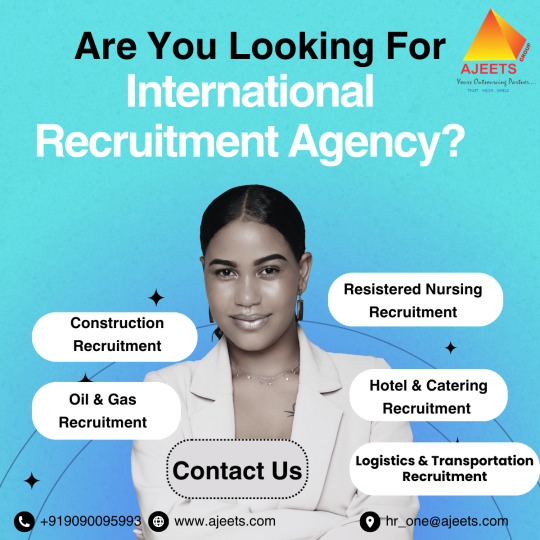
Are You Looking For an International Recruitment Agency?
#manpower agency#recruitment agency#hr consultancy#construction recruitment agency#employment agency#nurse recruiting agency#hotel staff recruitment#logistics recruitment
0 notes
Text
Work in Europe: Your Gateway to a Thriving Blue-Collar Career

Europe is a dream destination for blue-collar workers seeking stable jobs, competitive salaries, and career growth opportunities. With a rising demand for skilled labor across industries, countries like Germany, Poland, and the Netherlands are actively hiring international workers. If you’re an Indian professional aspiring to work in Europe, this guide by AAR Overseas will help you understand the process, from finding jobs in Europe to obtaining a work permit visa.
Why Work in Europe?
Europe offers a wealth of opportunities for blue-collar professionals, thanks to its:
High Demand for Labor: Many European countries face labor shortages in industries like construction, manufacturing, and logistics.
Attractive Salaries: Workers enjoy higher wages compared to other regions, even for entry-level roles.
Work-Life Balance: Europe is renowned for its employee-friendly policies, ensuring shorter working hours and better benefits.
Long-Term Prospects: With the right work permit, you can transition to permanent residency.
Diverse Industries: Opportunities range from agriculture and construction to hospitality and logistics.
Blue-Collar Job Opportunities in Europe
Top Sectors Hiring International Workers
Truck Drivers: Jobs for Truck Drivers
General Workers: Jobs for General Workers
Welders: Jobs for Welders
Construction: Roles for carpenters, masons, electricians, and welders.
Logistics: Jobs in warehousing, delivery, and transportation.
Manufacturing: Positions like assembly line workers, machine operators, and technicians.
Agriculture: Seasonal jobs in farming, fruit picking, and greenhouse work.
Hospitality: Opportunities for cooks, housekeeping staff, and kitchen assistants.
Countries Actively Hiring
Hungary
Luxembourg
Finland
Sweden
Lithuania
Austria
Latvia
How to Find Jobs in Europe
1. Use Job Portals
Leverage online platforms to explore job vacancies:
EURES: The official EU employment portal connects job seekers with European employers.
Indeed Europe: A comprehensive platform featuring diverse job listings.
Europa.jobs: Ideal for blue-collar professionals seeking overseas roles.
2. Work With Recruitment Agencies
Trusted recruitment agencies can match your skills with job openings, assist with paperwork, and streamline the hiring process.
3. Network Globally
Reach out to professionals already working in Europe or join social media groups and forums dedicated to job opportunities abroad.
4. Partner With AAR Overseas
We help you find suitable job openings, guide you through the application process, and ensure compliance with European labor laws. At AAR Overseas, we specialize in connecting Indian professionals with top European employers while ensuring a hassle-free visa process.
How to Get a Europe Work Permit Visa
1. Secure a Job Offer
A valid job offer from a European employer is essential for obtaining a work permit visa.
2. Choose the Right Visa Type
EU Blue Card: For skilled professionals, but can also apply to blue-collar workers with certifications.
Seasonal Work Visa: Ideal for temporary jobs in agriculture or tourism.
National Work Permits: Each country has unique regulations and visa requirements.
3. Submit the Necessary Documents
Prepare the following:
Valid passport.
Employment contract.
Proof of qualifications or work experience.
Health insurance coverage.
Financial stability proof.
4. Apply Through the Embassy
Submit your visa application at the respective country’s embassy or consulate and prepare for an interview if required.
Why Choose AAR Overseas?
Expert Guidance: Our team specializes in European work visa applications and recruitment.
Trusted Network: We collaborate with top employers and recruitment companies in Europe.
Customized Solutions: From job search to documentation, we provide tailored services to meet your needs.
Proven Track Record: With years of experience, we’ve successfully placed countless Indian workers in Europe.
Tips for a Successful Career in Europe
Enhance Your Skills: Obtain relevant certifications in your field, such as forklift operation or welding.
Learn the Basics of Local Languages: Knowing German, Polish, or Dutch can increase your employability.
Understand Employment Rights: Familiarize yourself with European labor laws to ensure fair treatment.
Be Open to Adaptation: Adjusting to a new culture and work environment will enhance your experience.
Conclusion
Working in Europe is a life-changing opportunity for blue-collar professionals, offering financial stability, career growth, and an improved quality of life. With the guidance of AAR Overseas, you can easily navigate the complexities of finding a job, securing a Europe work permit visa, and starting your journey toward a rewarding career abroad.
Don’t wait—take the first step today. Let AAR Overseas help you unlock a world of opportunities in Europe! About US
Meet Us 3A-156, Ground Floor, Near DAV College, K.L. Mehta Road, Faridabad – 121001, INDIA
Call Us +91 9811318899
Write Us [email protected]
#WorkInEurope#HighSalaryJobs#NoIELTS#TravelEurope#JobOpportunities#europevisa#FreeAccommodation#ExploreEurope#EuropeanDream#careerabroad#aaroverseas
0 notes
Text
Online Employer Registration: The Complete Guide With the present digital era, online employer registration is an important step in establishing legal and operational presence for businesses. It could be a small business startup or the expansion of a large organization. The registration process helps businesses to stay compliant with local labor laws, tax obligations, and other statutory requirements. The following is an in-depth guide to the process, benefits, and best practices for ensuring smooth employer registration.
What is Online Employer Registration? This is the electronic registration of your business as an employer with appropriate government agencies or institutions. Such a process involves getting a unique employer identification number (EIN) or equivalent and registering for local social security and tax systems. These, among others, entail conformity to labor laws, but requirements and processes do differ by country or region, with most offering online portals to speed up and simplify the process.
Why Is Employer Registration Important? Legal Compliance: Registration as an employer ensures compliance with the labor laws and regulations. It is a legal requirement to register before hiring any employees.
Tax Obligations: Employers need to deduct and remit taxes on behalf of the employees. Registration allows businesses to obtain necessary credentials, like an EIN, for fulfilling tax responsibilities.
Access to Benefits: Registered employers can enroll employees in health insurance, retirement plans, or social security programs as required by law.
Business Credibility: A registered business appears more legitimate, improving trust with clients, vendors, and potential employees.
Benefits of Online Registration Time Efficiency: Online platforms reduce the time spent on paperwork and trips to government offices. Employers can complete the process in minutes or hours instead of days.
Cost Savings: Online registration eliminates the need for intermediaries, saving administrative and logistical costs.
Convenience: The ability to access the portal 24/7 means employers can register anytime, anywhere.
Accuracy: Most platforms include validation checks to minimize errors during the registration process.
Transparency: Online systems often provide real-time updates and confirmations, ensuring clarity about application status.
Steps to Register as an Employer Online Although details are usually jurisdiction-dependent, this is the general procedure to fill up an online employer registration process:
Gather necessary information and documents Collect the following before applying to register the employer:
a. Business name and address as well as contact number b. EIN, if available or equivalent c. Registration number of the business d. Information about business owners or directors e. Expected employees as well as estimated payroll
Go to relevant website Find the website of the registration authority responsible for employers. These are often:
Tax authorities, such as the IRS in the U.S. or HMRC in the U.K. Social security agencies Local labor departments
Account Creation Most websites require a user to sign up with a secure login. Use an active email address and create a strong password. Some systems may require identity verification through email or SMS.
Online Application Fill out the registration form with correct information about your business. Be careful with the fields that are marked as required, as mistakes may delay your approval.
Supporting Documents Upload any additional documents that may be requested, such as proof of business registration or identity verification for owners.
Registration Fees (If Applicable) Some jurisdictions charge a small amount for employer registration. The online payment is usually done through credit/debit cards, bank transfers, or e-wallets.
Review and Submit Review all the information entered in your application. Once you submit your application, it is normally followed by a confirmation email or reference number.
Receive Certification The agency will issue an Employer Registration Certificate or other forms of evidence after verifying that your business is a registered employer.
Challenges when Online Employer Registration Technical Issues: Slow sites or technical downtimes will hinder the process.
Inaccurate Information: Errors in the submitted data may result in rejections or delays.
Document Requirements: Failure to submit or incorrect submission of documents may delay approvals.
Lack of Guidance: New business owners often do not know the specific requirements.
To overcome these issues, double-check your information, ensure all documents are ready, and consult a legal expert or accountant if needed.
Best Practices for Successful Registration Use Official Portals: Avoid third-party websites; always use the official government portal.
Be proactive: Register your business as an employer once you hire or plan to hire employees.
Keep records: Maintain digital and physical copies of all submitted forms and certificates.
Stay updated: Regulations may change; regularly review employer obligations in your jurisdiction.
Seek assistance: If the process seems complex, consult legal or tax professionals for guidance.
Conclusion Online employer registration makes a very important business process easy, allowing organizations to meet legal requirements in a hassle-free and efficient manner. By knowing the process, preparing the documents needed, and following best practices, employers can ensure a smooth registration process. This not only saves time and resources but also lays the foundation for a compliant and successful workforce. Whichever category one may fall in- a start-up or already-established company- taking digital registration would be forward thinking in this fast-moving corporate world.
0 notes
Text
How Recruitment Agencies are Facilitating Job Placement in Africa for Indians
The growth of Africa has been promising, with many countries experiencing rapid economic development and increased investment opportunities. As businesses expand and new industries emerge, the demand for skilled professionals has never been higher. African employers are increasingly looking beyond their borders to find the right talent to drive their companies forward. This is where the top IT recruitment companies in India come into play, bridging the gap between Indian job seekers and African employers, ensuring a seamless and efficient hiring process.
This blog will discuss the benefits of using recruitment agencies to secure employment opportunities in Africa for Indians, highlighting the advantages of working with professionals who understand the unique needs and requirements of both job seekers and employers in these regions.
The Role of Recruitment Agencies
Recruitment agencies play a pivotal role in connecting Indian professionals with jobs in Ghana for Indians. These agencies act as intermediaries, understanding the needs of both employers and job seekers to create a perfect match. They offer a range of services, from sourcing and screening candidates to facilitating interviews and handling the logistics of international placements. This comprehensive approach ensures that African employers receive well-vetted candidates who are ready to contribute from day one.
Specialising in international placements, these agencies possess the expertise required to navigate the complexities of cross-border recruitment. They are well-versed in the cultural nuances, legal requirements, and market dynamics of both regions, making the hiring process smoother and more efficient.
By leveraging their extensive networks and industry knowledge, construction recruitment agencies can provide African companies with access to a diverse talent pool, bringing in professionals who can drive innovation and growth. This collaboration not only benefits the companies but also opens up new career avenues for Indian job seekers, creating a win-win situation for all parties involved.
Challenges and Solutions
Despite the many benefits, the process of international job placement is not without its challenges. Indian job seekers often face hurdles such as cultural differences, language barriers, and visa regulations when considering opportunities in Africa. These challenges can be daunting, but recruitment agencies are well equipped to help candidates navigate them. By providing cultural training and language support, agencies ensure that candidates are well-prepared to adapt to their new environments. This preparation not only helps job seekers feel more confident but also enables them to integrate more smoothly into their new workplaces.
How Recruitment Agencies Help African Companies
For African employers, finding the right talent can also be a complex task. The local talent pool may not always meet the specific needs of their businesses, leading them to look internationally. Recruitment agencies like Ross Warner HR Solutions address this issue by leveraging their extensive networks to source candidates who possess the required skills and experience. They also handle the intricacies of the hiring process, from verifying qualifications to managing the legal aspects of international employment. This comprehensive support allows employers to focus on their core business activities while trusting that their recruitment needs are being expertly managed.
By overcoming these challenges, recruitment agencies create a win-win situation for both job seekers and employers. They facilitate a smoother transition for candidates moving to Africa and ensure that companies have access to the talent they need to thrive. This collaborative approach not only enhances the efficiency of the hiring process but also contributes to the overall success and growth of businesses in Africa. Through their dedicated efforts, recruitment agencies play a crucial role in bridging the gap between continents and fostering global career opportunities.

Conclusion
Recruitment agencies play a crucial role in bridging the gap between Indian job seekers and African employers. They offer a comprehensive range of services that streamline the hiring process, from initial consultations and assessments to handling the logistics of international placements. By leveraging their expertise and extensive networks, agencies like Ross Warner HR Solutions ensure that both job seekers and employers find the perfect match, leading to successful and mutually beneficial placements.
0 notes